CONTRIBUTED BY SPECIAL OLYMPICS
EP MAGAZINE JOINS SPECIAL OLYMPICS IN CELEBRATING NATIONAL DOWN SYNDROME AWARENESS MONTH WITH THESE REMARKABLE ATHLETES.
People with intellectual disabilities (ID) are accomplishing more than anyone ever thought possible, as Special Olympics athletes prove every day around the world.
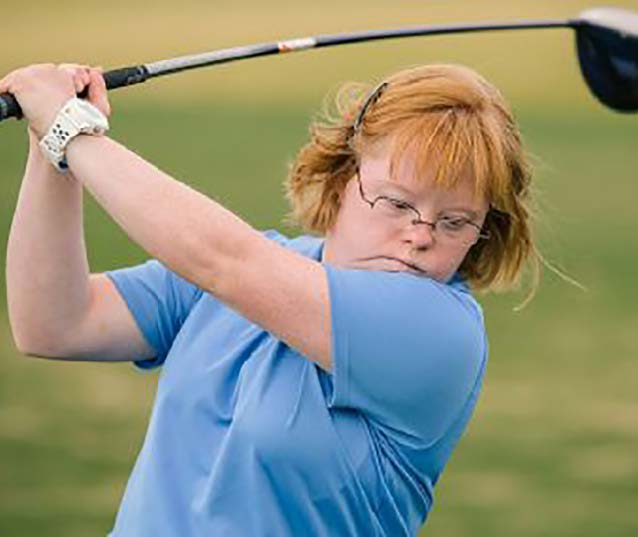
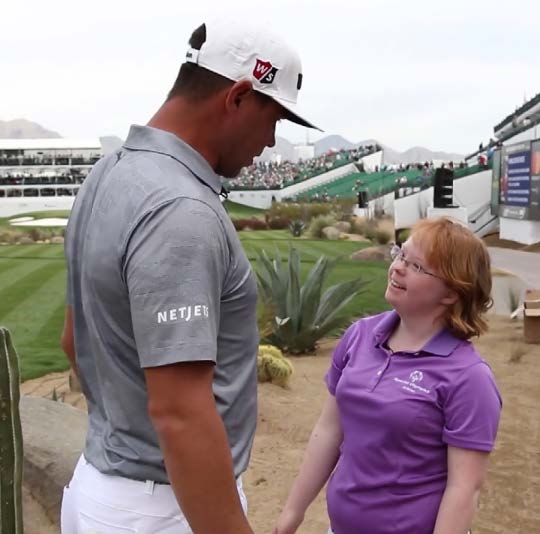
TEEING IT UP: (Above left) Amy concentrates on her golf swing; she loves to golf and crowds always cheer her on as she plays. (Above right ) Amy and last year's Phoenix Open champ Gary Woodland play TPC Scottsdale's 16th hole, which is notoriously difficult because of both its layout and the crowds who come to watch.
Yet, not that long ago, attitudes were very different. When Eunice Kennedy Shriver wanted to create a summer camp for young people with ID, she was told myth after myth, including that physical exertion might even be harmful for people with ID. Later, when she wanted to hold a "Special Olympics" in Chicago that would include swimming, organizers heard more myths, including that people with Down syndrome had "negative buoyancy"—and would drop in the water like rocks.
For Shriver, the whole point of such sports events was to change people's attitudes. So she made sure swimming and other sports were included in those first Games in 1968—and ever since. Since then, athletes with Down syndrome have emerged as versatile sports stars—from swimming to golf to gymnastics to judo. Recently, Special Olympics celebrated athlete Amy Bockerstette.
On the Field
Amy Bockerstette is the first person with Down syndrome to receive a college athletics scholarship, and when she was a highschool junior, she became the first Arizona student with Down syndrome to play in the state high school playoff.
Bocerstette wowed visitors and professional golfers alike, when she had the chance to play TPC Scottsdale's 16th hole, which is notoriously difficult because of both its layout and the crowds who come to watch. Amy, an Arizona native, showed up to the course to support last year's Phoenix Open champ, Gary Woodland, and nine-time PGA Tour winner Matt Kuchar, as they practiced for the Arizona tournament. Then, the pros asked her if she wanted to hit a few balls, as captured in a now-viral clip tweeted out by the PGA Tour.
Woodland and Kuchar both offered the athlete hugs, and when they complimented her skills on the course, she enthusiastically responded, "Yes!" Then she picked up her clubs and put on her shoes, and with a little assistance from her dad, she took her first shot. It landed in a sand trap by the green, but that didn't deter Amy, who easily hit the ball out and within feet of the hole.
When walking from the tee to the sand trap, she made small talk with Woodland and Kuchar about the crowd. "They love me! Awesome!" she said as Woodland asked, "You like all these people?" referencing how the crowds at hole 16 are daunting to many more experienced golfers. "Yes!" she replied, all smiles.
After a little encouragement from her new friends and herself — "Why don't you go ahead and make that?" Woodland said as Amy mumbled, "You got this" — she sank the putt to an eruption of cheers from the crowd. It was a 3-par hole, and she made it. "That is so awesome! You are so awesome!" Woodland exclaimed, laughing. Then Amy answered, looking around at the crowd, "Yes! Thank you!"
Reveling in her victory, Amy waved and blew the spectators two kisses. "You're an inspiration, you're our hero," Woodland gushed. Amy's father, Joe, went into detail about the play, "She's a gamer," Joe said. "She doesn't get nervous. She gets excited." He continued: "We knew a 120-yard shot was a sweet spot for her… So we gave her one of her top clubs… We had a good feeling that she'd hit a good tee shot."
Despite Woodland's offer to get her out of the bunker, "She said, 'No, I've got this,'" Joe recalled. "She was right." Amy's mother, Jenny, told the outlet that she felt "overwhelmed" watching her daughter play. "It was so exciting," she said. "What an experience."
Off the Field
"People with Down syndrome are individuals with unique personalities," says David Egan—and he should know. In his own unique way, he's spent the last few decades shattering stereotypes as a medal-winning athlete, trusted employee and sought-after public speaker.
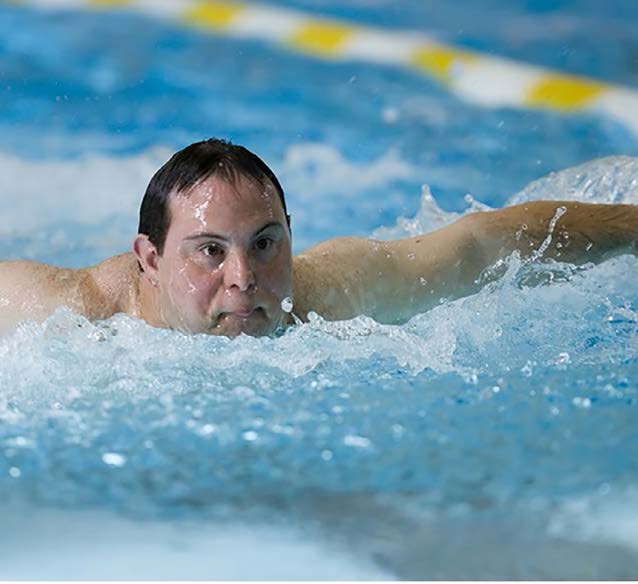
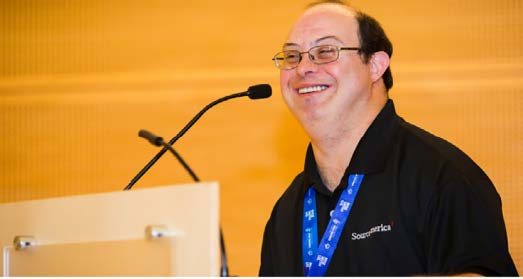
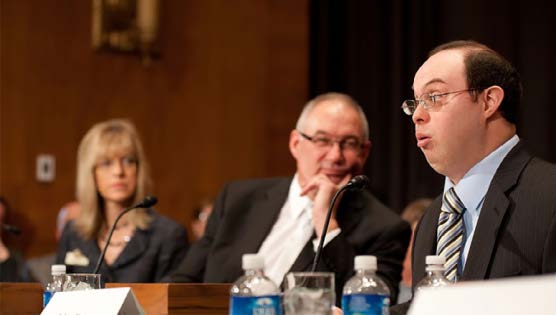
PERSONAL BEST: (Above left) David competes at a Special Olympics swimming event. (Above right) David is a born spokesperson and uses his voice to advocate for people with intellectual disabilities. He is the first person with an intellectual disability to be awarded the Joseph P. Kennedy Foundation Public Policy Fellowship, working with U.S. congressional offices on Social Security legislation.
David's also been a role model to adults and children with intellectual disabilities and to those without. Why? Because he's shown them all the wide range of successes that someone with Down syndrome can achieve – even if they have to overcome early skepticism from those around them.
"People with Down syndrome may have challenges, but we can learn with those who believe in us…those who have patience to discover our skills and the determination to make us succeed," he says.
When David was born in the 1970s, doctors gave grim predictions for the life of someone with Down syndrome. Typically, parents were told their baby would never walk, talk or benefit from higher education. Such a child could expect a life span of a decade or so, if that.
Now 41, David has proved everyone wrong. He's become the first person with an intellectual disability to be awarded the Joseph P. Kennedy Foundation Public Policy Fellowship, working with U.S. congressional offices on Social Security legislation.
After nearly 20 years at Booz Allen Hamilton, David is now a community relations specialist at SourceAmerica, advocating for employment of people with disabilities. He's also a past Special Olympics Sargent Shriver International Global Messenger. For this, he traveled the world as part of a select group of global spokespeople for Special Olympics. He also serves on several Boards to promote abilities and collaborate with other advocacy groups.
In March 2011, David testified at the Senate Health Education Labor and Pensions Committee promoting competitive employment for people with disabilities. He also addressed a global audience at the United Nations in New York City on World Down Syndrome Day, celebrating the rights of people with Down syndrome. David speaks at various conferences and fundraising events, building awareness and thanking supporters for their involvement in promoting respect, inclusion, and dignity for all people.
Yet, David has proved that Down syndrome is only a part of his life. "Down syndrome does not define us as people," he says. "It is a condition that makes it harder for us to learn, but with patience and persistence, we are able to contribute to our society."
David acknowledges that people with Down syndrome might need help on various levels – but who doesn't? "While we need help, I think that we can also help others see what matters in life," he says. "My brother Marc says that I taught him how to be compassionate and open to differences, seeing what unifies us."
Through it all, David has been involved in medical research studies – from the University of Wisconsin to the National Institutes of Health. He says, "Maybe people with Down syndrome are here to unveil the secrets of the brain. Who knows what will be discovered? Our extra chromosome may be a clue to better understand many diseases that affect the larger population like Alzheimer's, cancer, diabetes and heart problems."
He adds, "No matter my age or the fact that I have Down syndrome, I am a citizen that matters and I belong in my community. Our world is a better place with us…We should be included at all levels of our society from the womb to the grave."
In Special Olympics, the power and joy of sport, shifts focus to what our athletes can do, not what they can't. Attention to disabilities fades away. Instead, we see our athletes' talents and abilities -- and applaud them for all that they can do. And they are doing a lot! •